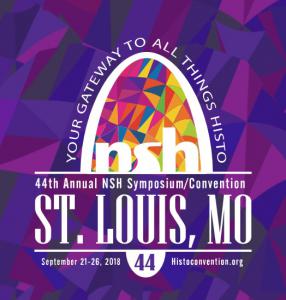
The Missouri Society for Histotechnology (MHT) Races to Fill Talent Pool for Histotechs
MHT looks to combat sparsity that will occur with an aging workforce and prevent wide spread pathology issues
When most people hear the word histotechnology, they think of history. However, this field relates to the work of those trained in the preparation and staining of tissue slides for microscopic examination and disease diagnosis by pathologists. Histotechnicians may be employed in a variety of areas, such as hospital laboratories, clinics, doctor's offices, research, veterinary pathology, marine biology, forensic pathology, and the pharmaceutical industry.
AnnaStacia Penrod, Secretary of MHT and Histology Supervisor, shares her prior experience as a histotechnician for the USDA. “Every cow that goes to market is inspected by a USDA inspector. They would find anything that was abnormal—it doesn’t look right. Their job is to find abnormalities- anything that doesn't look right- and send it to pathology. We would get samples from cows to test before [the meat] ever went to grocery stores. So, every time you see that [USDA] stamp in the grocery store, a histotech has tested it and a veterinarian has made sure it's healthy.”
Julie Trejo, President of MHT and Histotechnician II, provides an example of how histology plays an important role in the diagnoses and prevention of death. In the case of someone with suspected skin cancer, like melanoma, the histotechnologist carries out the procedure of preparing specimens for a pathologist. After biopsy by a surgeon, the tech cuts the skin thinner than paper to be placed on slides and stains it for the pathologist. A doctor can then examine for abnormalities of the cells. With early detection, when tests reveal a disease, the appropriate treatment can begin.
Penrod reports that the current local pool of histotechnicians have been attained by unconventional means.
“Most of the current histotechs are on-the-job trained. There are now schools for histotechnology that [didn’t exist] in the past. Part of our problem is that the regulation requires you to have certification, but you can’t get certification without going to school. [However], there aren’t enough schools. So, I’ve taken someone who is successful in a non-technical role and I have promoted them to a student position, assisted with their education, and trained them as a histotech. Many of my employees are straight from high school and we train them as assistants. Once they figure it out and they stay with it, we start training them on more in-depth tasks. [We] get them trained with college courses and certification programs. You can theoretically graduate from high school, land this job, enjoy it, [be paid by an establishment] to go to college while you’re still working for them all the way up until you graduate with a bachelor’s degree. Now you can run the entire department.”
Trejo shared the nearest histology program in the Midwest is Indiana; she is working to get one started in St. Louis. Eight of the histotechnicians where she currently works will be retiring in six years. There is a high demand for people with a degree in biology or chemistry because they can be trained onsite to be a histotechnician. Those who have not yet launched their careers and are interested in histotechnology are encouraged to seek out an 18-month histotechnology program, or work towards getting an Associates of Science or Bachelors of Biological Science degree.
“It’s a great niche field that a lot of people don’t know about,” states Penrod. “They don’t want to be a doctor and they don’t want to be a nurse. They like medicine and they like helping people but they don’t necessarily want that patient contact. That’s where we come in; we don’t do patient contact unless you’re in the hospital and you say hi to someone in the hallway.”
MHT’s hope is that their hosting of this year’s 44th Annual National Society of Histotechnology (NSH) Symposium/Convention, September 21 -26, will be beneficial for their mission.
“We need to get more histology students and the convention is a great place for students to come,” shared Trejo. “We have over 100 workshops. We have workshops where you get hands-on [engagement], computer workshops, and lectures. Last year we had over 1,000 [people], which included people from over 26 countries.”
Histotechnicians, histology managers and supervisors, pathologist, pathology assistants, and those who oversee quality assurance are encouraged to attend. The six-day event will take place at the America’s Convention Center Complex at 701 Convention Plaza in Downtown St. Louis. Registration is available at https://www.histoconvention.org.
About The Missouri Society for Histotechnology (MHT): MHT is dedicated to the advancement and education of histology professionals. The mission is to: 1) provide continuing educational programs for professional growth and advancement in the field of Histotechnology, 2) promote an organized group to unite the histotechnologists in the state of Missouri and surrounding areas and 3) promote an interchange of ideas and methods pertinent to the field of Histotechnology. For more information visit: http://www.missourihisto.org.
About The National Society for Histotechnology (NSH): NSH is a professional organization for individuals actively engaged in the histology field. Since its founding over 40 years ago, NSH's member community has grown to include over 3,000 histology professionals from around the world. Though much has changed, our mission has stayed the same; to empower the profession of histotechnology through collaboration, education and innovation. For more information visit https://www.nsh.org.
For more information about MHT or to schedule an interview please contact:
Charlotte R. Beard
Get It In Writing Services, LLC dba Writing Services by Char
(314) 560-7183
email us here
Preparing for a Histotechnology Career in the US
EIN Presswire does not exercise editorial control over third-party content provided, uploaded, published, or distributed by users of EIN Presswire. We are a distributor, not a publisher, of 3rd party content. Such content may contain the views, opinions, statements, offers, and other material of the respective users, suppliers, participants, or authors.



